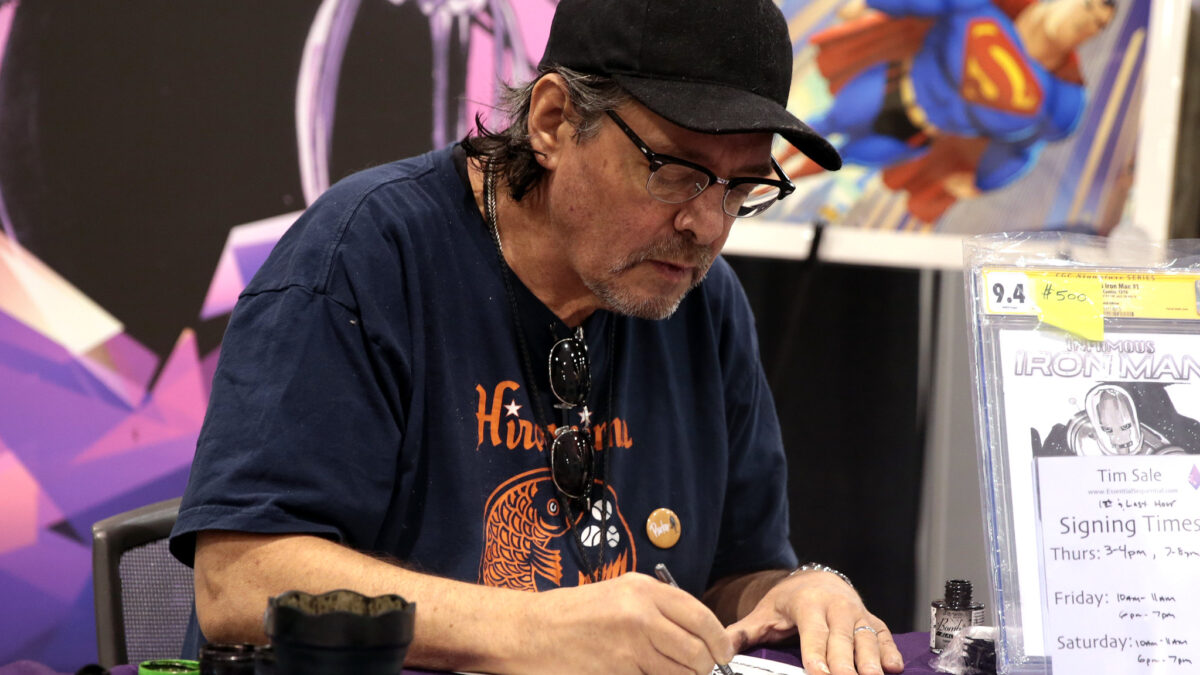Tim Sale died Thursday. He was one of the best and most iconic comic book artists of the last 30 years. He was known primarily for a handful of major collaborations with writer Jeph Loeb on Batman and Superman in particular. Their two most important works were probably “Batman: The Long Halloween” and “Superman for All Seasons.” But my personal favorite was “Spider-Man: Blue.”
“Superman for All Seasons” was probably their greatest work. Several years ago I picked it as the greatest Superman story ever, and I stand by that. And “Batman: The Long Halloween” is an amazing piece of art. But it was the six issues they did on Spider-Man that have always had my heart. They were maybe the most normal thing the two ever did, which highlights what made Sale so special: Nothing about his art was normal.
Sale’s work was incomparable. It was both sloppy and precise, passionate and calculating, obtuse yet highly relatable. There are probably many better artists working in comics, but no one has ever drawn like Sale. His work was always instantly recognizable. No one could draw a cover that looked like a Tim Sale other than Tim Sale.
Every great comic book artist is unique and different, and they all have things that make their work distinctive. Jack Kirby, for instance, was known for his power and action. His panels were overflowing with comic book wonder and consistent disregard for human anatomy. Then you have Alex Ross, who does oil painting based on actual human models. Frank Miller is abstract and animalistic. Jim Lee is a perfectionist, Neal Adams is a classicist, John Romita Jr. is chaos incarnate, Steve Ditko was the industry standard, etc. The list of amazing comic artists is endless. But they all seem to be having a kind of conversation with each other over the decades. They’re all playing a similar game, in essentially the same medium.
But Sale always felt like something else entirely.
Sure, he had influences. Superman for all seasons is at least 50 percent Norman Rockwell. But he also basically drew Superman like a huge thumb, and somehow we loved the Kryptonian even more that way. Sale had this ability to exaggerate and somehow make things feel more relatable at the same time.
What’s maybe most amazing about Sale is how little impact he’s had on the industry in terms of overt influence. That sounds like a bad thing, imitation being the most sincere form of flattery. But Sale’s style was so precise, so specific to him, that it couldn’t be imitated or even borrowed from. His artwork feels like a dream come to life; his pencil marks imbue characters with breath. Peter Parker and the Green Goblin seem like they are about to waltz right off the page, but not into our reality where bodies obey physics — rather, into some other plane of real existence.
That’s one of the reasons “Spider-Man: Blue” is my favorite by him. It’s so full of life, in a story about death. Each stroke of his pencil was laden with epic whimsy and romantic sadness. And his take on Spider-Man was pretty straightforward — the character looked like a normal Spider-Man, instantly recognizable, the way Ditko and Lee had designed him all those years ago, yet somehow completely original. Sale always made every character his own, and converted them into his own visual language.
“Spider-Man: Blue” is the tale of an older Peter Parker, now married to Mary Jane, remembering his first love and how they finally got together. For the uninitiated, Peter’s first and arguably truest love was Gwen Stacy who was killed by the Green Goblin. Peter is recording the story of their romance on tapes in the attic, but because it’s a true Spider-Man story their romance involves just about every one of the major villains from his rogues gallery. And Sale nailed the look for all of them. But what is even more impressive is how he got the more mundane characters so perfectly. Using the most subtle implications of shape and form he makes the reader see Gwen Stacy’s soul and understand why losing her was so tragic.
There’s never going to be another Tim Sale. Comic purists and more sophisticated art snobs than I may not see the great sadness that conveys, but his utter uniqueness is still breathtaking to me. When he drew the bat cape it would magically change sizes, becoming ridiculously huge, and yet it never seemed silly. Whatever he did made emotional sense of what was happening in the writing at that moment. His “Joker” has teeth that appeared to be 5 or 8 inches long, and yet you never questioned it. Whatever Sale gave the reader, we simply devoured in an act of sheer gratefulness.
Thank you, Tim, for all the beauty you put into this world while you were here. I pray that you rest in peace.









